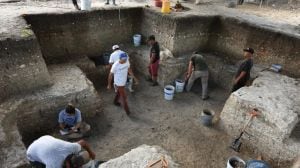Blair discovers Iraq inquiry verdict early
Tony Blair received an advance copy on Tuesday of a high-level report into British intelligence on Saddam Hussein’s weaponry, a deeply ...

Tony Blair received an advance copy on Tuesday of a high-level report into British intelligence on Saddam Hussein’s weaponry, a deeply unwelcome reminder of the Iraq war which has so damaged his premiership.
Officials said Blair saw the report at lunchtime, giving him almost a day longer than his opponents to digest the result of five months of inquiry by former top civil servant Lord Butler.
It is likely to be uncomfortable reading for a leader who took his country into war against overwhelmingly negative public opinion and may cost him dearly in two elections on Thursday in which a large Muslim vote could turn against him.
The report will be published on Wednesday and will force Blair to refocus on domestic politics ahead of next year’s expected general election.
‘‘With the history of Saddam … we are better, safer, more secure without him in office,’’ Blair told a news conference with Italian PM Silvio Berlusconi. Butler’s probe mirrors a Senate inquiry in Washington which last week found US intelligence agencies overstated the threat of Iraqi weapons, relied on dubious sources and ignored contrary evidence in the run-up to the 2003 invasion.
British intelligence is widely expected to be criticised too though most observers doubt Butler will take political scalps.
Blair persuaded Parliament to back war on Iraq on the basis that Baghdad had biological and chemical weapons.
A notorious UK dossier from September 2002 said some could have been fired within 45 minutes of an order to do so. Over a year after Saddam was ousted, no such weapons have been found. Blair admitted for the first time last week they may never be.
Colleagues insist Blair’s appetite for power is undimmed but senior ministers have been forced to quash rumours that he almost quit recently.
Experts say the failure of intelligence was important but was dwarfed by the use the government made of it.
Earlier this year, Lord Hutton’s inquiry into the suicide of weapons expert David Kelly unearthed intelligence officials whose doubts about the 2002 dossier were not acted upon.
—(Reuters)






- 01
- 02
- 03
- 04
- 05

























